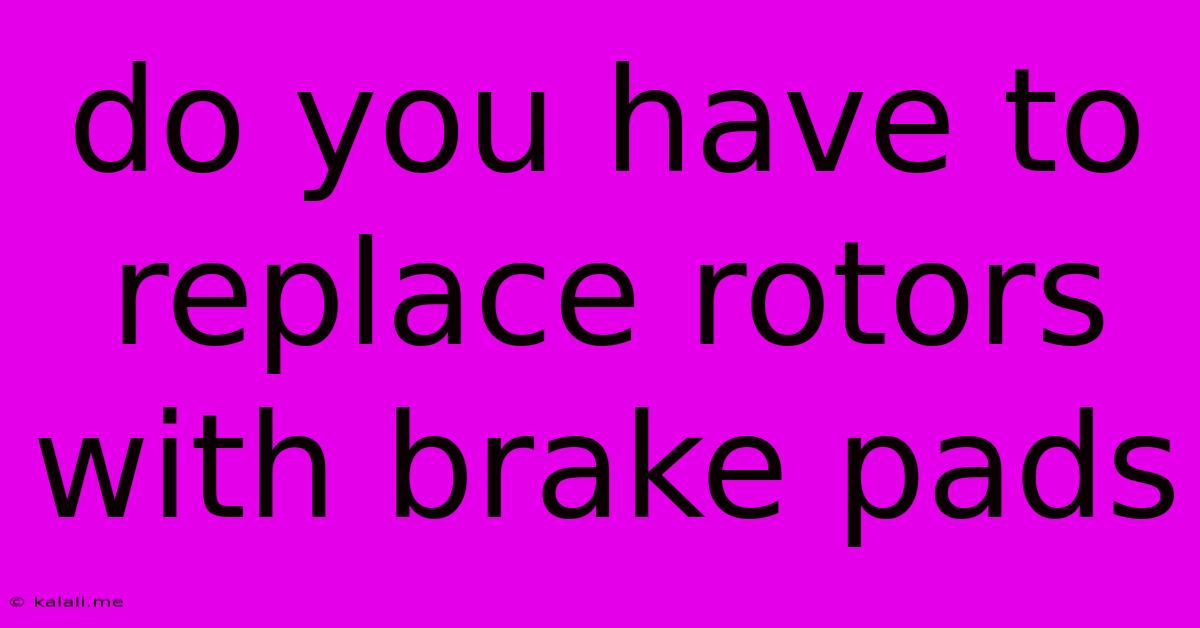Do You Have To Replace Rotors With Brake Pads
Kalali
Jun 07, 2025 · 3 min read

Table of Contents
Do You Have to Replace Rotors with Brake Pads? A Comprehensive Guide
Meta Description: Learn when you need to replace brake rotors with brake pads. This guide explains the lifespan of brake rotors, signs of wear, and the cost considerations involved in rotor replacement. We'll help you understand if your rotors need replacing alongside your brake pads.
Replacing your brake pads is a routine maintenance task for most car owners. But what about the brake rotors? Do they always need replacing at the same time as your pads? The short answer is: not necessarily. While it's common for brake rotors to require replacement eventually, it's not an automatic requirement every time you change your pads. This article will delve into the details, helping you understand when rotor replacement is necessary and when it can wait.
Understanding Brake Pad and Rotor Lifespan
Brake pads are consumable parts designed to wear down. Their lifespan depends on driving habits, braking frequency, and the quality of the pads themselves. You'll typically need to replace your brake pads every 25,000 to 65,000 miles, or even sooner if you do a lot of aggressive braking.
Brake rotors, on the other hand, are more durable. They are designed to withstand significant wear and tear. However, constant friction from the brake pads will eventually cause them to wear down, too. A healthy rotor will typically last significantly longer than a set of brake pads, often lasting for multiple pad replacements.
Signs You Need to Replace Your Brake Rotors
Several indicators signal that your brake rotors are nearing the end of their lifespan and need to be replaced, alongside or independent of your brake pads:
-
Grooved or Scratched Rotors: Deep grooves or significant scratches on the rotor surface indicate significant wear. These imperfections can compromise braking performance and cause vibrations while braking. This is a clear sign of needing rotor replacement.
-
Excessive Thickness Variation (TV): Brake rotors should have a consistent thickness across their surface. Excessive thickness variation (TV) means some parts of the rotor are thinner than others, causing brake pulsation or vibrations when braking. This often requires rotor resurfacing or replacement.
-
Warping or Distortion: A warped rotor is uneven, causing vibrations and a spongy brake pedal feel. This usually occurs due to overheating or severe impacts. Warped rotors should be replaced.
-
Excessive runout: This refers to the rotor not spinning perfectly true on its axis. This can lead to a pulsating brake pedal, which might not be noticed until it becomes fairly severe. This is also a sign of needing replacement.
-
Visible scoring or pitting: Deep scoring or significant pitting, resulting from extended use or damage, indicates that the rotor's integrity is compromised and should be replaced.
-
Minimum Thickness: Brake rotors have a minimum thickness specification. If your rotors have worn down below this minimum, they must be replaced. Consult your vehicle's owner's manual for the specifications.
When Rotor Replacement is Unnecessary
If your brake pads are worn, but the rotors still have sufficient thickness and show no signs of wear like those listed above (grooves, warping, excessive thickness variation), then rotor replacement isn't immediately necessary. You can simply replace the brake pads and continue monitoring the rotors for wear.
Cost Considerations
Replacing brake rotors is more expensive than replacing brake pads. Therefore, it's essential to assess the condition of your rotors carefully. If they're still in good condition, saving on the cost of rotor replacement is wise.
Conclusion
Replacing brake rotors with brake pads isn't always a requirement. The decision hinges on the condition of your rotors. While brake pads are consumable and require regular replacement, brake rotors are more durable and may only need replacing after several pad changes. By carefully inspecting your rotors for signs of wear, you can make an informed decision about whether or not to replace them along with your brake pads, saving you money and ensuring optimal braking performance. Always consult a qualified mechanic if you're uncertain about the condition of your brake system.
Latest Posts
Latest Posts
-
Recall Knowledge Players Know All Monsters
Jun 07, 2025
-
How To Send Messages To A Network Interface Using Ebpf
Jun 07, 2025
-
Can You Use Iodized Salt For Brining
Jun 07, 2025
-
Gfci Wont Reset After Power Outage
Jun 07, 2025
-
How To Repair A Leaking Car Fuel Tank
Jun 07, 2025
Related Post
Thank you for visiting our website which covers about Do You Have To Replace Rotors With Brake Pads . We hope the information provided has been useful to you. Feel free to contact us if you have any questions or need further assistance. See you next time and don't miss to bookmark.